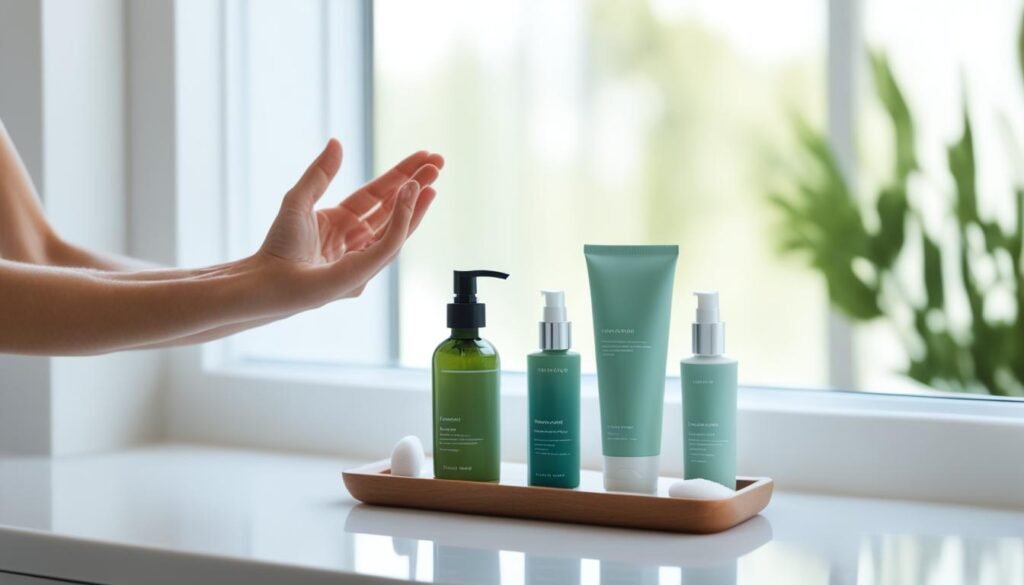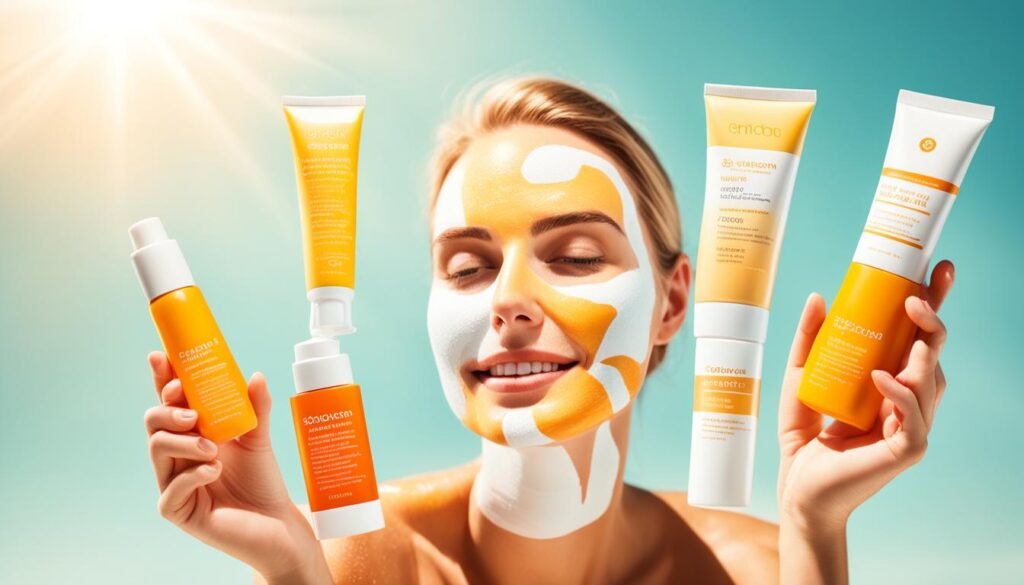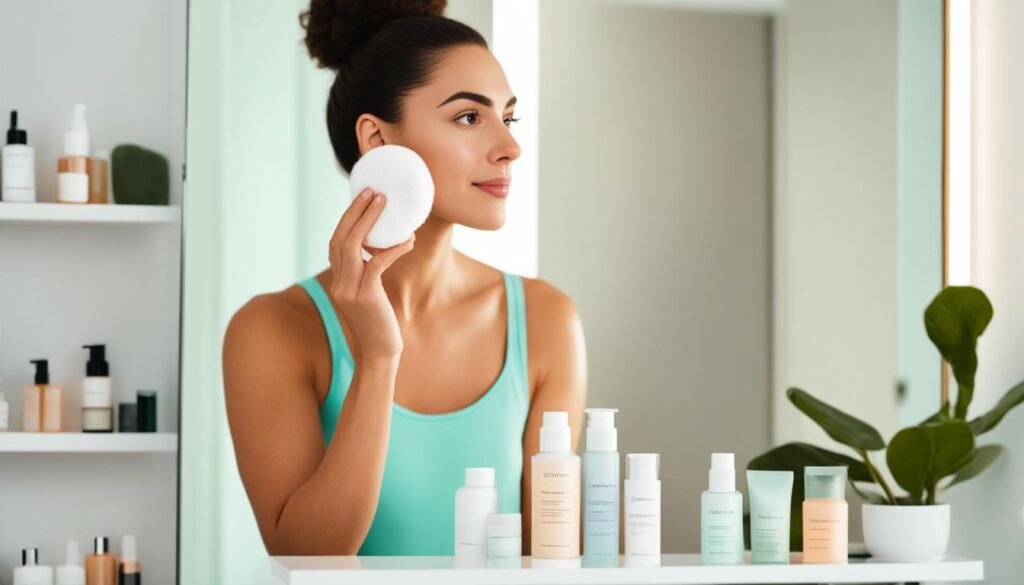Are you new to the world of skincare and looking to kickstart your journey to healthy and radiant skin? With so many products and techniques out there, it can be overwhelming to know where to begin. But fear not! In this beginner’s guide to skincare, we will provide you with the essential tips and information to help you start your skincare routine with confidence.
Skincare is not just about pampering yourself with luxurious products; it is a vital part of maintaining the health and appearance of your skin. By embracing a personalized skincare routine, you can address specific concerns, protect your skin from external aggressors, and achieve a healthy, glowing complexion.
From choosing the right products for your skin type to understanding the benefits of sunscreen and incorporating additional steps for enhanced results, this guide covers everything you need to know to get started on your skincare journey. Whether you have dry, oily, sensitive, or combination skin, these tips and recommendations will help you establish a routine that works for you.
So, are you ready to take the first step towards your skincare goals? Let’s dive in!
Key Takeaways:
- Starting a skincare routine is essential for maintaining a healthy and radiant complexion.
- Understanding your skin type and concerns will guide you in choosing the right products for your skincare routine.
- Protecting your skin from harmful UV rays with sunscreen is crucial.
- Incorporating additional steps like exfoliation and serums can enhance your skincare routine.
- Consistency and patience are key when it comes to skincare; results take time.
Why Taking Care of Your Skin is Important
Your skin is the largest organ of your body and plays a vital role in protecting you from environmental stressors. Maintaining a skincare routine is crucial in keeping your skin healthy and glowing. Regular care helps minimize dryness, blemishes, and irritation, while also providing a sense of self-care and rejuvenation.
When you take care of your skin, you are investing in its long-term health and appearance. A healthy skincare regimen can help prevent premature aging, reduce the risk of skin diseases, and improve your overall complexion. Let’s explore the benefits of a skincare routine and why it should be an essential part of your self-care routine.
The Benefits of a Skincare Routine
1. Healthy and Radiant Skin: A dedicated skincare routine ensures that your skin is nourished, hydrated, and protected from external aggressors. Regular cleansing, moisturizing, and exfoliating remove impurities, replenish moisture, and promote a brighter, more youthful complexion.
2. Prevention and Correction: Skincare products with targeted ingredients can address specific concerns such as acne, hyperpigmentation, fine lines, and wrinkles. Consistently using effective treatments and serums can help prevent these issues or minimize their appearance.
3. Self-Care and Relaxation: Taking the time for skincare rituals can be a form of self-care and relaxation. It allows you to slow down, focus on yourself, and indulge in a moment of wellness. Pampering your skin not only benefits its health but also boosts your overall well-being.
“Investing in a skincare routine is like giving yourself a daily dose of self-love. It’s a way to prioritize your well-being and show appreciation for your skin.” – mineraltones.com
Creating Your Skincare Routine
Building a skincare routine may seem overwhelming at first, but it doesn’t have to be complicated. Start with the basics – cleansing, moisturizing, and protecting from the sun. As you learn more about your skin’s needs, you can incorporate targeted treatments and additional steps.
Remember that each person’s skincare needs are unique, so it’s essential to choose products that suit your skin type and concerns. Consult a dermatologist or skincare professional if you need guidance in creating a customized regimen.
Investing time and effort in a skincare routine will pay off in the long run. You’ll not only enjoy healthier, more radiant skin but also the confidence that comes with taking care of yourself. Start your skincare journey today and embrace the skincare benefits that await!
The Basics of Skincare: Building Your Routine
When it comes to skincare, establishing a basic routine is essential, especially for beginners. A well-rounded skincare routine consists of four key components: cleanser, moisturizer, treatment, and sunscreen.
Cleanser
Start your skincare routine by cleansing your face with a gentle cleanser. This step helps remove dirt, excess oil, and impurities that can clog your pores and lead to breakouts. Choose a cleanser suitable for your skin type, whether it’s oily, dry, or sensitive. Massage the cleanser onto damp skin, then rinse with lukewarm water.
Moisturizer
After cleansing, it’s important to moisturize your skin to keep it hydrated and nourished. Moisturizers create a protective barrier that locks in moisture, preventing dryness and improving the overall texture of your skin. Opt for a moisturizer that suits your skin type, whether it’s a lightweight lotion, a rich cream, or a gel-based formula.
Treatment
Treatments are products that target specific skincare concerns, such as acne, hyperpigmentation, or fine lines. Incorporating a treatment into your routine can help address these issues more effectively. Common treatment products include serums, spot treatments, or targeted creams. Choose a treatment based on your specific needs and concerns.
Sunscreen
No skincare routine is complete without sunscreen. Sunscreen is crucial for protecting your skin from harmful UV rays, which can cause premature aging, sunburns, and even skin cancer. Look for a broad-spectrum sunscreen with an SPF of 30 or higher and apply it as the last step of your skincare routine, even on cloudy days.
Remember, consistency is key when it comes to skincare. Stick to your routine day and night, and don’t forget to perform a double cleanse in the evening if you wear makeup or sunscreen. Now that you understand the basics of building a skincare routine, you’re ready to take the first steps towards healthier, happier skin.

| Skincare Step | Product | Description |
|---|---|---|
| Cleanser | Gentle Facial Cleanser | Removes dirt, oil, and impurities from the skin. |
| Moisturizer | Hydrating Face Cream | Keeps the skin moisturized and nourished throughout the day. |
| Treatment | Anti-Aging Serum | Targets fine lines and wrinkles for a more youthful complexion. |
| Sunscreen | Broad-Spectrum SPF 50 | Protects the skin from harmful UV rays. |
Choosing the Right Products for Your Skin
Finding the right skincare products is crucial for establishing an effective skincare routine that caters to your skin type and addresses your specific concerns. Whether you have sensitive, dry, oily, or combination skin, personalized skincare is key to achieving optimal results.
Consider the following factors when selecting skincare products:
- Your Skin Type: Identify whether you have sensitive, dry, oily, or combination skin. This will help you choose products that are formulated to meet your skin’s unique needs.
- Specific Concerns: Determine any specific concerns you want to address, such as acne, signs of aging, or hyperpigmentation. Look for products that target these specific issues.
- Sensitivity: Take into account any sensitivities or allergies you may have. Fragrance-free or hypoallergenic options can be beneficial for those with sensitive skin.
| Skincare Product Recommendations | Benefits |
|---|---|
| Cleanser | Gently removes dirt, oil, and impurities without stripping the skin’s natural moisture. |
| Moisturizer | Hydrates and nourishes the skin, helping to maintain its elasticity and prevent dryness. |
| Treatment | Targets specific concerns like acne, wrinkles, or dark spots. Choose treatments based on your individual needs. |
| Sunscreen | Provides essential protection against harmful UV rays, preventing premature aging and reducing the risk of skin cancer. |
To further enhance your skincare routine, you can incorporate additional products such as serums, face masks, and exfoliators. However, remember to introduce new products gradually and observe how your skin reacts.
Expert Tip:
Consulting with a dermatologist or skincare professional can provide valuable insights into the best products for your skin type and concerns. They can guide you in creating a personalized skincare routine that will effectively address your unique needs.
“Remember, skincare is not a one-size-fits-all approach. Finding the right products for your skin type is the key to achieving your skincare goals.”
The Different Types of Sunscreens
When it comes to protecting your skin from the harmful effects of the sun, sunscreen is a must-have in your skincare routine. However, not all sunscreens are created equal. There are two main types of sunscreens: chemical and mineral-based.
Chemical Sunscreens
Chemical sunscreens work by absorbing UV rays and converting them into heat, which is then released from the skin. They contain chemicals such as octocrylene or avobenzone, which are responsible for this UV ray absorption. Chemical sunscreens are lightweight and often come as a lotion or spray.
Mineral Sunscreens
Mineral sunscreens, also known as physical sunscreens, act as a physical barrier on the skin, reflecting and scattering UV rays away from the skin’s surface. They contain minerals like zinc oxide or titanium dioxide, which provide broad-spectrum protection against both UVA and UVB rays. Mineral sunscreens are gentle on the skin and work well for those with sensitive skin.
Both chemical and mineral sunscreens offer effective UV protection, but they differ in their mode of action and ingredients.
Fun Fact: Did you know that chemical sunscreens are often more water-resistant compared to mineral sunscreens?
Choosing the right sunscreen for you depends on your preferences and skin type. If you have sensitive skin or prefer more natural ingredients, mineral sunscreens may be the better option. On the other hand, if you prefer a lightweight, easy-to-spread formula, chemical sunscreens may be more suitable.
Regardless of the type you choose, it’s essential to look for a sunscreen with an SPF (Sun Protection Factor) of 30 or higher. This ensures adequate protection against both UVA and UVB rays.
To help you decide which sunscreen is best for you, here’s a comparison:
| Chemical Sunscreens | Mineral Sunscreens |
|---|---|
| Contain chemicals like octocrylene or avobenzone | Contain minerals like zinc oxide or titanium dioxide |
| Work by absorbing UV rays | Work by reflecting and scattering UV rays |
| Often lightweight and easy to spread | Gentle on the skin and suitable for sensitive skin |
| More water-resistant | May leave a subtle white cast on the skin |

Ultimately, the most important thing is to wear sunscreen every day, regardless of the type you choose. Protecting your skin from the sun’s harmful rays is crucial for maintaining a healthy and youthful complexion.
Additional Steps to Enhance Your Skincare Routine
Now that you have established a basic skincare routine, it’s time to take it to the next level. By incorporating these additional steps, you can enhance the effectiveness of your routine and achieve even better results for your skin.
Exfoliation
Exfoliating your skin regularly is essential for maintaining a healthy complexion. It helps remove dead skin cells, unclog pores, and promote cell turnover. There are two types of exfoliation: physical exfoliation and chemical exfoliation.
Physical exfoliation involves using scrubs, brushes, or exfoliating tools to physically remove dead skin cells. Be gentle with your skin to avoid irritation or damage.
Chemical exfoliation, on the other hand, involves using products that contain alpha hydroxy acids (AHAs) or beta hydroxy acids (BHAs). These ingredients help to dissolve dead skin cells and reveal a fresh, radiant complexion.
Remember to start with exfoliating once or twice a week and gradually increase the frequency based on your skin’s tolerance.
Targeted Treatments with Serums
Serums are lightweight, concentrated formulas that penetrate deeply into the skin. They are designed to target specific skin concerns and deliver active ingredients effectively.
Whether you want to address signs of aging, hyperpigmentation, or dryness, there are serums available to help you achieve your skincare goals. Look for serums that contain powerful antioxidants, hyaluronic acid, or other targeted ingredients that cater to your specific needs.
Pamper Your Skin with Masks
Masks are a luxurious addition to any skincare routine. They provide a concentrated dose of active ingredients and can address a range of concerns, from hydration to brightening to soothing irritated skin.
Consider incorporating both sheet masks and wash-off masks into your routine. Sheet masks are soaked in serums and provide instant hydration, while wash-off masks gently exfoliate and nourish the skin. Use masks once or twice a week to give your skin an extra boost of nutrients and hydration.
Remember to choose masks that are suitable for your skin type and concerns.
Enhance your skincare routine with these additional steps, and you’ll notice a visible improvement in the health and appearance of your skin. Incorporate exfoliation, serums, and masks to target specific concerns and pamper your skin with the care it deserves.
Skincare Tips to Keep in Mind
When it comes to skincare, following the right tips can make all the difference. Here are some important tips to keep in mind for a healthy and radiant complexion.
Less is more
When it comes to skincare, remember that less is more. Overwhelming your skin with too many products can do more harm than good. Stick to a simple routine with a few key products that address your specific skincare concerns. This way, you can give your skin the attention it needs without overwhelming it.
Patience is key
Skincare is not an overnight solution. It takes time for products to show their full effects and for your skin to adjust. Don’t expect instant results and be patient with your skincare journey. Consistently following a skincare routine and giving it time to work will yield better and more long-lasting results.
Consistency is crucial
Achieving and maintaining healthy skin requires consistency. Make skincare a daily habit by sticking to your routine. Cleanse, moisturize, and protect your skin from the sun every day. Consistent care will provide the best results and help your skin stay healthy and vibrant.
Opt for fragrance-free products
Fragrances in skincare products can be potential irritants for sensitive skin. To minimize the risk of allergies and irritations, opt for fragrance-free products. These are formulated without added scents, making them suitable for all skin types, even those with sensitivities.
Remember, taking care of your skin is a long-term commitment. By following these skincare tips – embracing the concept of less is more, having patience, maintaining consistency, and opting for fragrance-free products, you’ll be on your way to achieving a healthy and radiant complexion.
Understanding Comedogenicity and Fungal Acne
When it comes to skincare, understanding comedogenicity is essential, especially for individuals prone to acne. Comedogenicity refers to the ability of a product to clog pores, leading to the formation of blackheads, whiteheads, and pimples. Using non-comedogenic products is crucial in preventing pore-clogging and reducing the risk of acne breakouts.
Non-comedogenic products are specially formulated to have a low likelihood of clogging pores. They typically contain ingredients that are less likely to cause congestion, allowing your skin to breathe and remain clear. When choosing skincare and makeup products, look for labels or claims stating “non-comedogenic” to ensure they won’t exacerbate acne or lead to blemishes.
However, it’s important to note that the term “non-comedogenic” is not regulated by the FDA, meaning manufacturers have their own criteria for making this claim. Some non-comedogenic products may still cause breakouts in sensitive individuals. Therefore, it’s essential to pay attention to how your skin responds to different products and adjust your routine accordingly to avoid potential irritations.
In addition to comedogenicity, some individuals may experience a specific type of acne known as fungal acne. Unlike traditional acne caused by bacteria, fungal acne is triggered by an overgrowth of yeast on the skin’s surface. It typically appears as small, uniform bumps and can be itchy and stubborn to treat.
Treating fungal acne requires specific antifungal medications and a skincare routine that avoids pore-clogging ingredients. These ingredients include fatty acids, oils, and certain emollients that can exacerbate the condition. If you suspect you have fungal acne, consult a dermatologist for an accurate diagnosis and appropriate treatment options.
To ensure you’re using suitable skincare products for your skin type, it’s crucial to read and understand labels and ingredients lists. Look for products labeled non-comedogenic and consider consulting a dermatologist for personalized recommendations. Removing pore-clogging ingredients from your skincare and makeup routine can help maintain clear and healthy skin.
| Pore-clogging Ingredients to Avoid | Skin-friendly Alternatives |
|---|---|
| Mineral Oil | Jojoba Oil |
| Isopropyl Myristate | Squalane |
| Butyl Stearate | Glycerin |
| Lanolin | Shea Butter |
| Acetylated Lanolin | Cocoa Butter |
The Role of Moisturizers and Makeup
Moisturizers and makeup play integral roles in our daily skincare routines. However, it’s crucial to choose non-comedogenic options that won’t clog pores or contribute to acne breakouts.
When selecting a moisturizer, opt for lightweight, oil-free formulas that won’t feel heavy on the skin. Look for non-comedogenic moisturizers that provide hydration without leaving a greasy residue. These formulations help maintain skin moisture levels without clogging pores, making them suitable for all skin types, including acne-prone individuals.
The same applies to makeup products. Choose non-comedogenic foundations, powders, and concealers that won’t block your pores. These products often have a lighter texture and allow your skin to breathe while providing coverage. They are formulated to minimize the risk of causing blemishes or irritating acne-prone skin.
Incorporating non-comedogenic moisturizers and makeup can help you maintain a clear and healthy complexion. By paying attention to product labels and ingredient lists, you can ensure that these products won’t contribute to pore-clogging or aggravate existing acne.
Key Skincare Ingredients to Look For
Skincare products often contain various beneficial ingredients that target specific skin concerns. Understanding these ingredients can help you choose products that cater to your specific skincare needs.
Azelaic Acid
Azelaic acid is a versatile skincare ingredient known for its exfoliating effects and effectiveness against acne and rosacea. Derived from grains like wheat and barley, it helps unclog pores, reduce inflammation, and fade post-acne scars. Its gentle yet effective properties make it suitable for various skin types, including sensitive skin.
Benzoyl Peroxide
Benzoyl peroxide is a powerful ingredient that effectively combats inflamed acne-causing bacteria. It penetrates deep into the skin to kill bacteria and reduce redness and swelling. It also helps unclog pores, prevent new breakouts, and improve overall skin texture. However, benzoyl peroxide can cause dryness or irritation, so it’s important to start with a low concentration and gradually increase as tolerated.
Chemical Exfoliants (AHAs and BHAs)
Chemical exfoliants, specifically alpha hydroxy acids (AHAs) and beta hydroxy acids (BHAs), are commonly found in skincare products and are excellent for removing dead skin cells and excess sebum. AHAs like glycolic acid and lactic acid gently exfoliate the skin’s surface, promote cell turnover, and improve texture and brightness. BHAs like salicylic acid penetrate deeper into the pores, unclog them, and help reduce acne and blackheads. Incorporating chemical exfoliants in your skincare routine can reveal smoother, clearer, and more radiant skin.
Desert Essence Skincare for Natural Care
If you’re looking for natural skincare solutions that are as effective as they are gentle, look no further than Desert Essence. With a commitment to harnessing the power of plant-powered ingredients, Desert Essence offers a range of skincare products that nourish and revitalize the skin.
Whether you have dry, oily, or sensitive skin, Desert Essence has options tailored to meet your unique needs. Their skincare collection is thoughtfully formulated to deliver the best results using nature-inspired ingredients. From the moisturizing properties of jojoba oil to the soothing qualities of tea tree oil, Desert Essence products are designed to provide a healthy and radiant complexion.
Desert Essence’s dedication to natural skincare goes beyond their ingredients. Their products are free from harsh chemicals, parabens, and artificial fragrances, making them a safe and eco-friendly choice for your skincare routine.
With Desert Essence skincare, you can indulge in self-care while knowing you’re using products that are good for you and the environment. Discover the power of plant-based skincare and experience the difference for yourself.
| Benefits of Desert Essence Skincare | Key Ingredients |
|---|---|
| Nourishes and revitalizes the skin | – Jojoba oil: Provides deep hydration – Tea tree oil: Soothes and calms the skin – Aloe vera: Hydrates and soothes – Cactus flower extract: Protects against environmental stressors |
| Suitable for all skin types | – Dry skin: Shea butter and coconut oil provide intense moisture – Oily skin: Witch hazel and lemon tea tree oil help balance oil production – Sensitive skin: Chamomile and cucumber soothe and calm irritation |
| No harsh chemicals or artificial fragrances | – Free from parabens, sulfates, and phthalates – Cruelty-free and vegan |
Start Your Skincare Journey with Confidence
Now that you have gained essential tips and knowledge from this beginner’s guide to skincare, it’s time to embark on your skincare journey with confidence. A healthy complexion begins with building a skincare routine that suits your unique skin type and concerns.
Remember to be patient and consistent as you navigate through different products and techniques. Skincare is a continuous process, and results may take time to show. Don’t be afraid to experiment with various skincare products and methods to find what works best for you.
Embrace the self-care journey and enjoy the positive changes that a well-nurtured and radiant complexion can bring. Visit mineraltones.com and mineralsparkle.com to explore a wide range of skincare products that will assist you on your skincare journey. With commitment and perseverance, you can achieve a healthy and glowing complexion that you can confidently show off to the world.

